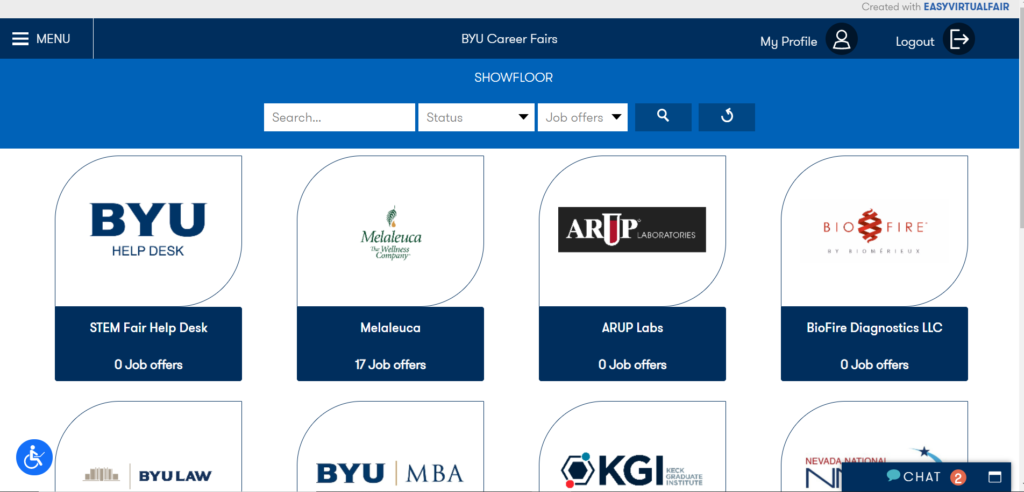
BYU is holding virtual career fairs to connect students to job opportunities amid the uncertainty of employment during COVID-19.
The Science Career fair kicked off the start of a series of focused virtual fairs for STEM students on Wednesday, Sept. 16. The Math and Data fair occurred the next day, Sept. 17. Upcoming fairs include technology, engineering, internships, communications, life sciences, government careers and human services.
BYU Careers and Experiential Learning Director of Events and Marketing Meghann Larkin said after the research done on COVID-19 this summer, “we have found that interactions within a virtual setting do need some limits to be successful.” Thus, focused individualized fairs were created to network students with potential employers and further education.
Larkin said her team did their best to adapt the fairs to provide a great experience online. “Fairs give students a chance to engage with recruiters, practice professionalism and plan for their future.”
The virtual fair consisted of individual “booths” or webpages for each company that attended. The individual companies then designed their booth how they wanted it to represent them. Different sections included internships and jobs listed, basic company information, links to their company website or social media pages, and a chat option.

Home page of virtual career fair displays separate “booths” for the employers. Students can navigate easily to a specific company. (Cassidy Wixom) 
Keck Graduate Institute’s virtual booth had sections for job links, profiles, networks, the chat and more. (Cassidy Wixom)
The chat bar was open to all who attended, giving the students a direct way to talk to potential employers. There was a public chat for each booth and an option to privately message an employer if the student was interested.
Even though the online fairs aren’t ideal for some, Zach Valdez from Keck Graduate Institute pointed out that most companies have already adjusted to a more digital world. Valdez attended the fair as a recruiter to expose students to higher education opportunities offered at Keck. “Recruiters have strengthened their online presence to meet new graduates,” said Valdez. “It is important to still make connections with the next generation of aspiring professionals.”
Ambassador from BYU Law Glen Thurston said students have more opportunities with employment now because he increasing connectivity around the globe in this digital era can bring new associations between people that weren’t possible before. “I think that students may even have an easier time finding employment because they are able to apply to and compete for jobs remotely that they normally wouldn’t be able to compete for.”
While some companies are hiring less, companies involved in the health world have been hiring more than ever. Melaleuca, a popular online wellness shopping club, is one of those companies. “Although our on-boarding looks different, it’s still full steam ahead,” said Melaleuca University Relations Senior Manager Reed Buchanan.
The students and employers who attended also said the online platform gives new opportunities, but doesn’t allow for human connection.
“Online communication allows for a lot of different modalities of communication, but doesn’t provide the same level of intimacy as in-person communication,” Valdez said.
Thurston said without the ability to call out to those walking past, students who don’t know what they’re interested in might miss out on an opportunity for themselves. It’s harder for students to “shop around” the different booths when there aren’t people immediately in front of them to talk to.
“These career fairs have a lot of potential to help connect you with employers. But face to face interaction allows them to see your personality. How am I supposed to present myself to a potential employer with any kind of memorability through some random chat?” said Harrison Dresser, a senior studying microbiology.
Buchanan echoed the same idea about face to face interaction. “(In person) you can chat and read body language. We can feel their enthusiasm and excitement of job searching. You can get to know someone so much better in person than you can over the web.”
Employment for new graduates is attainable even in this pandemic. Larkin suggests all students start planning for their futures.
“Attend the virtual fairs. Meet with your Career Director. Go for the internship. Don’t wait and don’t delay. There have been some incredible opportunities for our students. We are here and want to help you get started,” she said.




